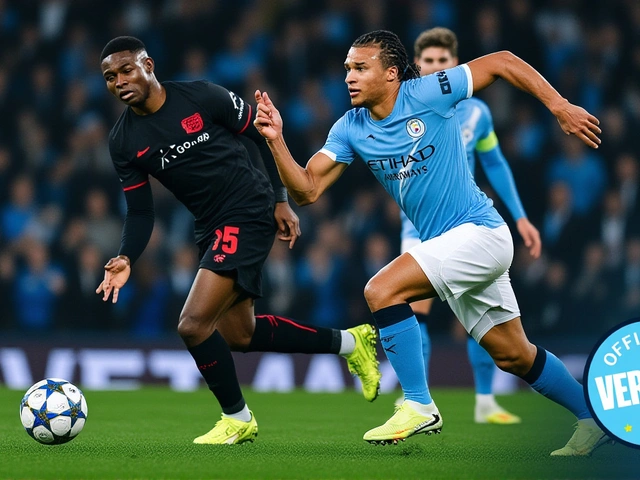On November 14, 2025, the South Africa Springboks kept their grip on the top of the World Rugby rankings after a routine 32-14 win over Italy in Turin — but it was England’s stunning 33-19 upset of the New Zealand All Blacks at Twickenham Stadium that sent ripples through the global rugby hierarchy. While the Springboks didn’t gain a single point for their victory, the All Blacks lost 1.03 points, widening the gap between first and second to 2.73 points. That’s the largest lead South Africa has held since reclaiming the top spot earlier this year — and it’s shaping up to be decisive for the Men's Rugby World Cup 2027 draw in December.
Why South Africa Didn’t Gain Points — And Why New Zealand Did
It’s counterintuitive, but in rugby’s ranking system, not every win earns points — especially when the gap in strength is vast. The Springboks, ranked No. 1 with 93.06 points, faced Italy (No. 10 at 78.98), a mismatch that meant no ranking points were awarded for the win. The system rewards beating strong opponents, not just winning. Meanwhile, the All Blacks, previously at 91.35, lost points because they were defeated by England, a top-four team ranked just below them. That’s the beauty — and brutality — of World Rugby’s formula: margin of victory, home advantage, and opponent strength all factor in. England’s win wasn’t just historic — it was mathematically devastating for New Zealand.
England’s Historic Win Changes the Game
This was England’s ninth win over New Zealand in 120 years of Test rugby. At Twickenham, under a cold London sky and a roaring crowd, the hosts outplayed the All Blacks in every phase — defense, set pieces, and crucially, discipline. New Zealand coughed up five penalties in the first half alone, and England’s fly-half capitalized with four precise kicks. The final score, 33-19, wasn’t a fluke. It was the culmination of a tactical reset by England’s coaching staff, who abandoned the high-risk, high-reward style that had failed them in recent years. Instead, they played a grinding, territorial game — and it worked. For the first time since 2021, England climbed back into the top four, and suddenly, the race for World Cup seeding got a lot more interesting.
The Seeding Domino Effect
With the Men's Rugby World Cup 2027 draw set for December, these rankings are the blueprint. The top four teams automatically land in Band 1 — the safest pot. Right now, that’s South Africa, Ireland (88.85), England (88.06), and France (86.95). New Zealand, at 90.32, is still in Band 1 — barely. But if they lose again before December, they could slip to Band 2. That’s a nightmare scenario for New Zealand Rugby: facing the likes of Argentina or Australia in the group stage instead of a guaranteed top-four draw. Meanwhile, Scotland — currently eighth — could leapfrog into Band 1 if they beat Australia or Argentina in their final November Tests, and those teams falter. It’s a tight race. One win, one loss, and the entire seeding map flips.
Who’s Rising, Who’s Falling
Beyond the top five, the rankings tell a story of momentum. Uruguay climbed four spots to 15th, thanks to a gritty win over Chile. The United States, Samoa, and Chile all moved up one place — signs that Tier 2 nations are closing the gap. Portugal, now 20th, is within 0.14 points of Uruguay — and if they win their upcoming match in Lisbon, they’ll leapfrog them. Even Namibia and Poland are inching closer to the 60-point threshold, a psychological barrier that separates the established from the aspirational. Meanwhile, Wales (73.57) and Japan (73.25) are locked in a battle for 12th and 13th — a rivalry that’s heating up as both aim for a spot in the 2027 tournament.
What’s Next? The Final Countdown to December
With just over a month until the World Cup draw, every match matters. South Africa faces France in Saint-Denis on November 22 — a match that could either cement their dominance or expose vulnerability. New Zealand plays Scotland in Edinburgh — a venue where they’ve lost before, and where the pressure is mounting. Ireland, sitting third, takes on Argentina in Dublin — a clash that could push them ahead of England. And don’t forget Wales vs. Japan on November 20. That game might not change the top four, but it could determine who gets the last automatic qualifying spot in Band 1. The rankings aren’t just numbers. They’re pressure points. They’re legacy builders. And for the first time in years, they feel alive.
Behind the Numbers: How the Rankings Work
World Rugby’s system isn’t just win-loss. It’s a complex algorithm that weights:
- Match result (win, draw, loss)
- Margin of victory (up to 5 bonus points for wins by 16+ points)
- Home advantage (a 3-point bonus for home teams)
- Opponent strength (beating a top-10 team is worth more than beating a bottom-tier side)
That’s why South Africa didn’t gain points against Italy — the differential was too wide. But New Zealand lost points against England because they were beaten by a higher-ranked team. It’s designed to punish complacency and reward upsets. The system works — and it’s why this November felt like a turning point.
Frequently Asked Questions
Why didn’t the Springboks gain ranking points after beating Italy?
World Rugby’s ranking system doesn’t award points for lopsided wins against significantly weaker opponents. Since Italy was ranked 10th and South Africa was 1st, the point differential was too large — the system considers such matches as expected outcomes, so no points are added. This prevents top teams from inflating their scores against lower-ranked sides.
How close is New Zealand to falling out of Band 1 for the 2027 World Cup?
New Zealand is currently at 90.32 points — just 0.74 points ahead of Ireland (88.85) and 2.26 points ahead of England (88.06). A single loss to Scotland or Argentina before December could push them below England or Ireland, potentially dropping them to Band 2. That would mean facing stronger teams in the group stage, which could jeopardize their title defense.
Can Scotland still make it into Band 1 for the 2027 World Cup?
Yes — but only if they beat Australia or Argentina, and one of those teams loses to a lower-ranked side. Scotland currently sits at 81.21, but if Australia drops points to Wales or Argentina loses to Ireland, and Scotland wins their final match, they could jump to sixth and into Band 1. It’s unlikely, but mathematically possible — and it’s the kind of scenario that keeps rugby fans up at night.
What does this mean for South Africa’s legacy?
Maintaining a 2.73-point lead over New Zealand is the largest gap since 2023. If they hold it through December, it’ll be their longest tenure at No. 1 since the 2019 World Cup cycle. That consistency — winning when it counts, even without gaining points — signals a new era of dominance. They’re not just the best team; they’re the most reliable.
How do these rankings affect the 2027 World Cup draw?
The top four teams as of December 1, 2025, will be seeded in Band 1, avoiding each other in the group stage. The next four go into Band 2, and so on. This ensures stronger teams don’t face off too early. South Africa’s lead gives them a buffer — but one bad result in November could still shake things up. The draw isn’t just about rankings — it’s about survival.
Why is the England vs. New Zealand match considered historic?
England has only beaten New Zealand nine times in 120 years of Test rugby. Their last win at Twickenham was in 2014. This 33-19 victory was their first win over the All Blacks by more than 10 points since 2003 — and the most points they’ve scored against New Zealand in London since 1997. It’s a sign England may have found a new identity under coach Steve Borthwick.






